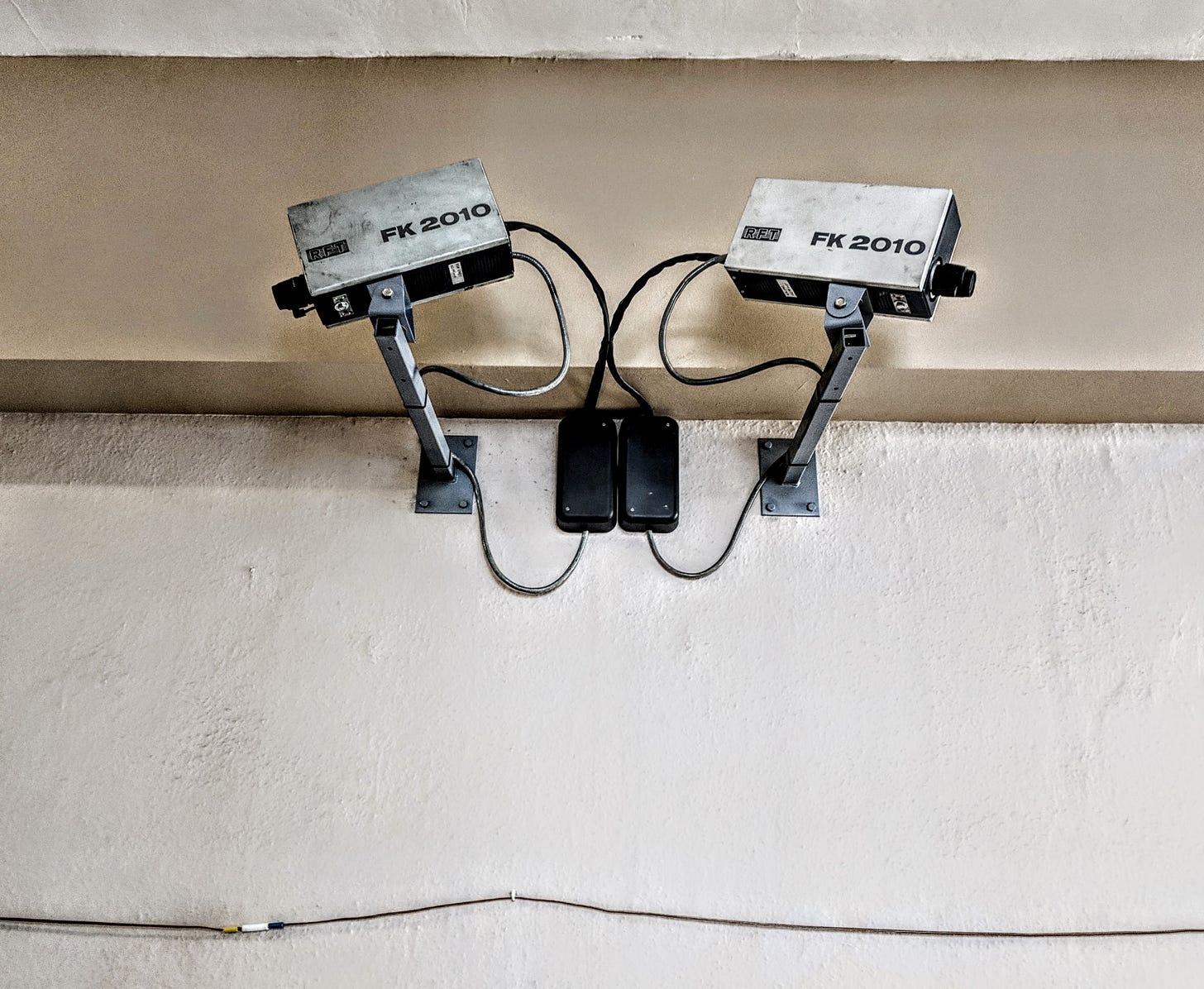What if Big Tech Helps *Prevent* Government Surveillance?
At least, for now.
“Surveillance intermediaries” like Meta, Google and Apple — companies which transmit and hold vast quantities of user data — are frequently asked to share that sweet, sweet data with inquiring governments.
But these same intermediaries also can, and frequently do, push back on those requests. It’s not an ideal system — but what if it’s the best we can hope for today?

As we discussed last week, the lines separating private citizens, large tech companies, and governments have become increasingly blurry.
I quoted extensively from a Harvard Law Review piece there — and I’ll do more today, don’t you worry! — exploring the implications of what law scholar Alan Rozenshtein calls “surveillance intermediaries.” These are telecommunications and tech companies like AT&T, Meta, Google, and Apple that transmit and hold vast quantities of user data. And companies which, because of this, are frequently requested to share that data with inquiring governments.
But as the Harvard Law piece points out, these same intermediaries can push back on government requests, and curtail surveillance. And perhaps this is a good thing?
It’s easy to see why it’s unideal for large, for-profit corporations to serve as the primary protectors of millions of citizens against both hacking by foreign governments, and surveillance by their own. Nowhere in the charter of these companies is it written they must work to protect consumer privacy and security.
Happily, the incentives of these companies — to retain users and customers, and, let’s be honest, absolutely print money off them — tend to align with consumer privacy desires.
But this alignment is by no means necessary, nor complete, nor guaranteed.

There’s a tendency, I think, for some of us on the political left to brush off concerns of state surveillance. Many of us haven’t seen the negative impacts of this in our lifetimes (at least, not yet) — but it doesn’t take long to seek them out.
Something I love about Berlin is the city’s willingness to embrace the darkest spots of its past. Walking through the city, one readily encounters beautifully somber Holocaust memorials, preserved segments of the Berlin Wall, and reminders of a history of state violence at Cold War landmarks like Checkpoint Charlie.
I once visited another of these memorials to Germany’s history: Hohenschönhausen, the former Stasi (East German secret police) prison and interrogation center. The prison featured prominently in the excellent 2007 film The Lives of Others, which won the Best International Feature Film Oscar. Much of the picture was in fact filmed at the prison site itself, and the plot dramatically explores the implications of heavy state surveillance on the lives of private citizens in Cold War East Berlin.
The Hohenschönhausen prison museum today serves as a staunch reminder of the dangers of state surveillance. And a fresh one: it was in active use until the fall of the Berlin Wall itself, in 1989.
Given their country’s preservation of past horrors and their recency, it’s no accident that Germans tend to value privacy— and fear technological incursions on it — more highly than almost anyone else in the world.
One need not look hard for other examples of government surveillance, with devastating consequences. As I discussed at length this spring, China has built perhaps the most extensive state censorship and surveillance network in the world. And even there, popular tech companies have found themselves in the crosshairs between government wishes for surveillance, and consumers’ for privacy.
As reported in Harvard Business Review in 2018:
“Even China’s opaque behemoths have started the year with unprecedented acknowledgements of the need to address trust concerns: Tencent had to publicly deny that it collects user WeChat history after it was openly challenged; Alibaba’s Ant Financial apologized to users of its mobile-payment service for automatically enrolling them in its social-credit scoring service.”
It shouldn’t surprise us to learn that Russia and Iran have built vast internal surveillance networks as well. And the advanced surveillance software Pegasus, produced by Israel’s NSO group, has been exported to aid government monitoring in at least twenty countries around the world, including the U.S. The list of Pegasus customers includes Saudi Arabia, Myanmar, and Rwanda, none of which have stellar human rights records. (The Council of Foreign Relations link there counts nineteen countries using the software, but it's since come to light that Indonesia uses it, too.)
And it’s not only dictatorships who strive to use technology intermediaries to surveil populations. Democracies throughout history have shown a willingness to respect the privacy rights of one class of citizens, while ignoring those of others.
Extensive reporting has revealed for instance that the same Pegasus software built in Israel and exported to governments around the world is first trialed and perfected among Palestinian civilians in the occupied West Bank and Gaza.

Even for certain American communities, the dangers of government surveillance have never been distant: American Indian and Black civil rights leaders and activists were notoriously wiretapped and surveilled by J. Edgar Hoover’s FBI in 1960’s America.
And US government flirtations with surveillance date back even further than this. Monitoring of telegraph wires seems to have begun under Lincoln during the Civil War to “prevent the transmission of intelligence to the Southern traitors.” And Western Union pushed back on government requests to share telegraph contents for decades after, just as tech companies often do today.
As Tomas Jepsen points out in Technology Stories by The Society for the History of Technology (SHOT),
“Telecommunications services were always provided by private industry in the U.S. in the nineteenth and twentieth centuries, unlike most other countries, where government-run posts, telegraphs, and telephone services existed. For this reason, the history of the U.S. telecommunications industry provides a unique opportunity to study the relationship between government and industry as privacy concerns emerged.”
It’s in fact remarkable to note the prescience of these words, published in 1868 in the Nashville Tennessean, in forecasting complaints of tech company mediation of government surveillance today:
“If the Western Union Company do not propose to stand on their right to maintain the privacy of all messages, and test, up to the highest courts if necessary, this their duty as the confidential and trusted agents of the public, then one of the strongest practical objections to Governments owning a telegraph line will fall to the ground; for this outrage, by violation of rightful privacy, which a private telegraph company may prevent, or be punished for permitting, a Government could commit with secresy [sic] and impunity.”

Let’s return to the modern notion of the “surveillance intermediary,” the large tech companies like Google, Meta, Apple, and Microsoft that hold reams of user data useful to governments for surveilling their own citizens (and hacking those elsewhere.) Western Union was one of these too, of course — only on a smaller, more local scale, and over 150 years ago following the American Civil War. But that company was a surveillance intermediary all the same.
These intermediaries do often appear to take the side of user privacy, as the Harvard Law Review article I’ve referenced notes:
“In 2016, Microsoft quashed a search warrant from the Southern District of New York seeking data stored on servers in Ireland related to a narcotics case, arguing that the warrant violated the presumption against extraterritoriality. That same year, Apple challenged the use of the All Writs Act in the Eastern District of New York for a narcotics case, and again, famously, in the Central District of California for a terrorism case.
In 2017, Facebook lost a challenge against the Manhattan District Attorney’s Office for search warrants related to a disability fraud case. Finally, in October 2017, the U.S. government, facing a lawsuit by Microsoft, developed strict guidelines on the use of gag orders by U.S. Attorneys. These are just a few examples of major face-offs between surveillance intermediaries and the government, demonstrating the existence of a resistant band of technology companies fighting against perceived government overreach.”
Even in the case of the 2015 San Bernardino shooting (the “Central District of California terrorism case” noted above), Apple pushed back on FBI requests to unlock the suspected shooter’s phone. And notably, this wasn’t even a popular position at the time: a Pew study found that the majority of Americans sided with the Justice Department, and believed Apple should have handed over the suspect’s private phone data to law enforcement.
But as the Harvard Law Review piece is quick to point out, even this move aligned with Apple’s ultimate corporate goal — which is not necessarily to protect user information, but to make fat stacks of cash. It just so happened at the time that for Apple, these two goals happened to align.
Bold in the text is my doing:
“Apple’s decision to resist the All Writs Act so publicly served to highlight an iPhone feature that differentiates Apple from many of its peers: the use of encryption so strong that even Apple cannot access its users’ devices…. Apple’s resistance to the All Writs Act was therefore likely motivated by its desire to differentiate itself from its peers.”
So the system of “surveillance intermediaries” protecting citizens from wanton government surveillance may not be perfect. But there are strong arguments that it’s better than the alternative.

Again, from Harvard Law. I’m sorry to quote at such length, but I believe these are all important points worth considering — and trust me when I say I still cut a lot:
“First, the existence of surveillance intermediaries between the government and end users is a helpful mechanism for our legal system: “[W]hen surveillance intermediaries resist government surveillance, they… amplify the ability of Congress and the courts to regulate the surveillance state…
Second, and relatedly, technology companies almost certainly know more about law enforcement requests for information than any other entity — including the government. Companies like Facebook, Google, and Twitter receive court orders from federal, state, and local governments. They can learn the idiosyncrasies of different offices, differentiate “normal” requests from aberrant ones, and identify concerning patterns…
Third, technology companies are better situated to pursue surveillance-related litigation than any individual. There are a number of reasons why it is unlikely that any one person would be able to successfully sue the government over routine subpoenas and search warrants…
Fourth, large technology companies have the resources to invest in robust policy teams that can devote themselves to evaluating the validity of law enforcement requests for information, responding to emergencies, and developing long-term litigation strategies when necessary…
Finally, the existence of large technology companies as surveillance intermediaries is an enormous benefit to law enforcement agencies… Data held by surveillance intermediaries has been indispensable to cases relating to terrorism, murder, and other serious crimes.”

Ultimately, states the Review:
“By providing a degree of transparency to government requests and making independent assessments of their legality, surveillance intermediaries can provide a valuable backstop to the Executive’s law enforcement powers and set a ceiling on government overreach…
Setting a ceiling and floor for compliance with government requests for information is an incredibly valuable role for surveillance intermediaries to play — and technology companies are well equipped to do it.”
So “surveillance intermediaries” — beginning with Western Union 150 years ago, and leading up to Google, Meta, Apple, and Microsoft today — provide both a “floor and a ceiling” on government surveillance.
Should we feel great that our best chance against overzealous government eyeballs — at least in places where we enjoy robust legal systems — is a series of multi-billion and -trillion dollar corporations? Probably not.
But is it the best system we might hope for today? Probably, and unfortunately, yes.
Song of the Week: Arcade Fire — Flashbulb Eyes

